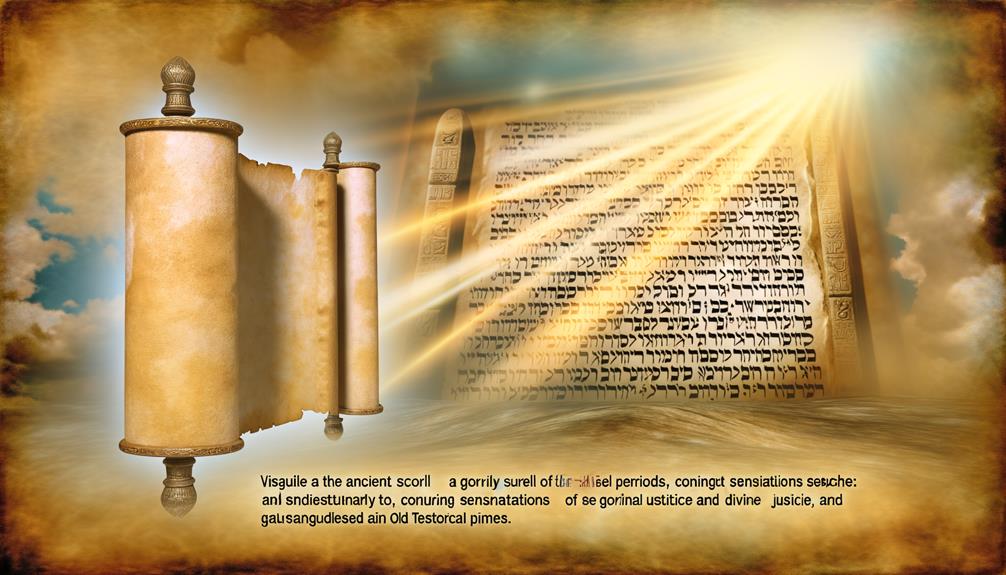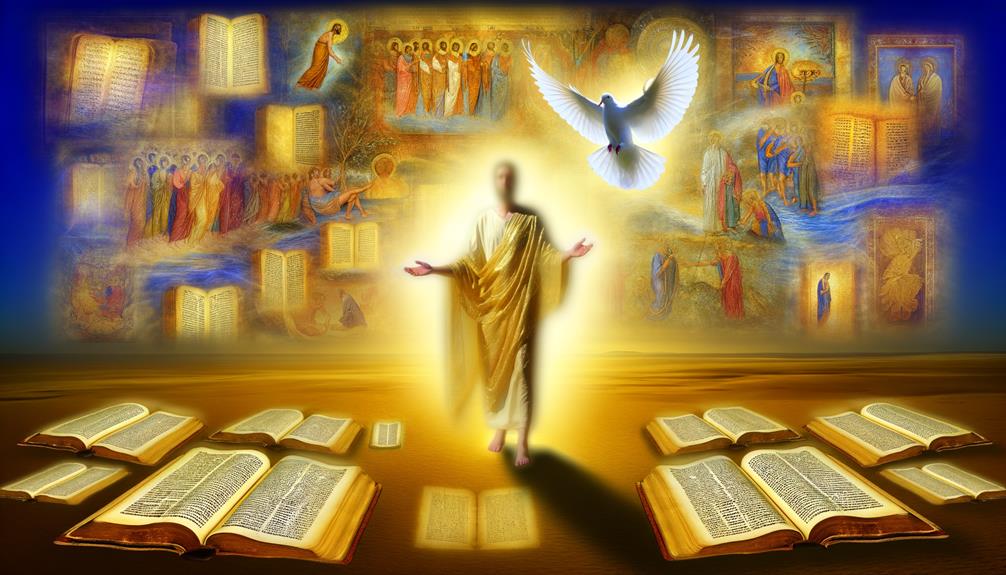Vindicator Meaning In The Bible: Defender of Justice
In the Bible, a ‘Vindicator‘ refers to God as the ultimate enforcer of justice and righteousness, restoring moral order and balance rather than exacting mere vengeance. This concept, rooted in ancient Near Eastern divine kingship, is extensively explored in scriptures such as Psalm 18:2, which describes God as a “rock, fortress, and deliverer.” In the New Covenant, Christ embodies the ultimate vindicator, fulfilling divine justice through His death and resurrection.
By examining figures like Moses and Jesus, one can gain deeper insights into the restorative essence of divine vindication and its theological significance.

Vindicator Meaning in the Bible: Defender and Divine Justice
| Aspect | Description |
|---|---|
| Definition | One who defends, justifies, or clears from blame |
| Biblical Usage | Isaiah 54:17; Job 19:25 |
| Divine Role | Often refers to God as the ultimate vindicator of the righteous |
| Spiritual Meaning | Symbolizes justice, redemption, and divine advocacy |
| Symbolic Insight | Reflects God’s protection and the eventual justification of His people |
Biblical Definition of Vindicator

In biblical terminology, a ‘vindicator‘ is often understood as one who upholds justice and righteousness, typically attributed to God in His role as the ultimate judge and protector of the oppressed.
This concept is deeply rooted in the ancient Near Eastern understanding of divine kingship, where the deity is seen as a righteous judge who guarantees moral order.
Theologically, a vindicator is not merely an avenger but a restorer of balance, acting in accordance with divine law.
Scriptural analysis reveals that vindication involves both judgment against wrongdoers and deliverance for the faithful.
God’s role as vindicator underscores His commitment to justice and righteousness, reflecting His covenantal faithfulness and His unwavering support for those who are wronged or marginalized.
Old Testament References

In the Old Scriptures, the concept of God as a Vindicator is prominently illustrated through His roles as Protector and Deliverer.
Passages such as Psalm 18:2 and Isaiah 54:17 underscore God’s commitment to safeguarding His people and ensuring their triumph over adversaries.
These texts not only reflect the theological assertion of divine justice but also highlight the historical context in which the Israelites experienced God’s intervention against their enemies.
God as Protector
Demonstrating His role as a divine protector, God is frequently depicted in the Old Scriptures as a shield and refuge for His people, offering both physical and spiritual safeguarding.
In Psalms 18:2, the Lord is described as ‘my rock, my fortress, and my deliverer,’ symbolizing unwavering protection. Deuteronomy 33:27 speaks of ‘the eternal God‘ as a refuge, with ‘everlasting arms’ that support His followers.
Historically, this portrayal underscores the Israelites’ reliance on divine intervention during their trials. Theologically, it reveals God’s omnipotence and enduring commitment to His covenant with Israel.
Such scriptural references provide a profound understanding of God’s protective nature, reinforcing faith and trust among believers in His constant presence and guardianship.
Deliverance From Enemies
Throughout the Old Covenant, numerous passages illustrate God’s role in delivering His people from their enemies, exemplifying His power and faithfulness. This theme is woven throughout the historical and prophetic books, highlighting the divine intervention in Israel’s struggles.
Key examples include:
- Exodus 14: The parting of the Red Sea, showcasing God’s might in liberating the Israelites from Egyptian bondage.
- Judges 7: Gideon’s victory over the Midianites with only 300 men, demonstrating divine strategy.
- 1 Samuel 17: David’s triumph over Goliath, symbolizing God’s empowerment of the faithful.
- 2 Kings 19: The defeat of the Assyrian army, revealing God’s protection of Jerusalem.
These instances affirm God’s role as the ultimate Vindicator and Deliverer.
New Testament Insights

How does the New Covenant elucidate the concept of vindication, especially through the life and teachings of Jesus Christ? In the New Scripture, Jesus embodies the ultimate vindicator, fulfilling prophecies and demonstrating divine justice and mercy.
His crucifixion and resurrection symbolize the triumph of divine justice over human sinfulness, serving as the ultimate act of vindication for humankind.
| Aspect | Explanation |
|---|---|
| Life of Jesus | Embodiment of divine vindication |
| Teachings of Jesus | Emphasis on mercy, love, and justice |
| Crucifixion | Atonement and ultimate act of vindication |
| Resurrection | Triumph over sin and death, affirmation of truth |
This profound theological shift underscores the New Covenant’s transformative power, where vindication is not merely about retribution but about restoring righteousness.
Vindicator and Justice

In the biblical framework, the role of the vindicator is intrinsically tied to the concept of divine justice, as evidenced in both Old and New scriptures narratives.
This divine justice encompasses not only retributive aspects but also restorative dimensions, highlighting God’s commitment to uphold righteousness and rectify wrongs.
Scripturally, figures such as Moses and Jesus serve as archetypal vindicators, executing God’s justice and embodying His redemptive purposes for humanity.
Divine Justice Explained
The concept of divine justice in the Bible, particularly through the lens of a vindicator, intertwines with the profound themes of righteousness, retribution, and restoration as depicted in both the Old and New Scriptures.
Divine justice is not merely punitive but aims at restoring balance and righteousness. This justice is often represented through God’s actions and His chosen agents.
- Righteousness: God’s justice aligns with His inherent righteousness.
- Retribution: Divine justice includes the principle of just recompense.
- Restoration: Justice seeks to restore both individuals and communities.
- Covenantal Faithfulness: God remains faithful to His promises.
Understanding these elements provides a holistic view of how justice and vindication operate within the biblical narrative.
Biblical Vindicator Roles
Throughout the biblical narrative, various figures emerge as vindicators, embodying the divine justice that upholds righteousness, exacts retribution, and seeks restoration.
Particularly, Moses stands as a key vindicator, delivering the Israelites from Egyptian oppression, a manifestation of God’s justice (Exodus 3:9-10).
Similarly, figures like Deborah and Gideon in the Book of Judges act as instruments of divine retribution against Israel’s enemies, reaffirming God’s covenantal promises (Judges 4-5, 6-8).
The ultimate vindicator, however, is Jesus Christ, whose life, death, and resurrection encapsulate divine justice and mercy, offering both judgment and redemption (John 5:22-24).
These roles underscore a theological paradigm where vindicators serve as conduits for divine justice, balancing judgment with grace.
Righteousness and Vindication

How does the concept of righteousness intertwine with the notion of divine vindication in biblical texts, revealing a profound theological and historical narrative?
In the Bible, righteousness is often portrayed as a prerequisite for divine vindication, where God’s justice is manifested in defending and rewarding the righteous. The Psalms, for instance, frequently depict God as a righteous judge who vindicates the oppressed and faithful.
This intertwining is evident in several key scriptural themes:
- Covenantal faithfulness: God’s promises to protect and vindicate His people.
- Judgment and justice: Righteousness as a criterion for divine judgment.
- Prophetic declarations: Prophets calling for righteousness to secure divine vindication.
- Messianic expectations: The Messiah as the ultimate righteous vindicator.
This connection underscores the Bible’s portrayal of a just and faithful God.
Divine Intervention Examples

Building upon the intertwined themes of righteousness and divine vindication, numerous biblical narratives provide compelling examples of divine intervention where God’s justice and protection manifest in the lives of His people.
The Exodus story stands as a monumental instance, where God liberates the Israelites from Egyptian bondage, illustrating divine justice (Exodus 12:31-42).
Similarly, Daniel’s deliverance from the lion’s den (Daniel 6:22) exemplifies God’s protection over the righteous.
The story of Esther highlights divine orchestration in averting genocide, with the Jews’ enemies defeated (Esther 9:1-5).
These narratives demonstrate that divine intervention is not merely historical but a confirmation of God’s ongoing commitment to justice and vindication for those who uphold righteousness.
God’s Role as Defender

Scripture consistently portrays God as the ultimate Defender, dynamically intervening to protect and vindicate His people against their adversaries. From the Old Covenant to the New, God’s role as a protector is vividly illustrated, underscoring His unwavering commitment to justice and righteousness.
In examining this theme, several key aspects emerge:
- Covenantal Promises: God’s defense is deeply rooted in His covenants with Israel and humanity.
- Historical Deliverance: Instances such as the Exodus and David’s triumph over Goliath showcase God’s protective intervention.
- Prophetic Assurance: Prophets like Isaiah and Jeremiah emphasize God’s promise to defend His people.
- Christ’s Sacrifice: The ultimate defense through Jesus Christ’s atonement.
This theological framework reveals a God who is both protector and vindicator, steadfast in His defense of His people.
Modern Faith Implications

Understanding God’s role as Defender in biblical times provides a profound foundation for exploring how this divine attribute influences and shapes modern faith practices and beliefs.
The concept of God as Vindicator underscores a continuing reliance on divine justice and protection amidst contemporary challenges.
Historically, scriptures such as Psalm 43:1 and Isaiah 54:17 illustrate God’s commitment to defend His people, a principle that resonates today.
Believers are encouraged to trust in God’s ultimate judgment and intervention, fostering resilience and hope.
This theological understanding informs modern worship, prayer, and communal support, reminding the faithful that divine vindication transcends temporal injustice.
Consequently, the ancient notion of God as Defender remains integral, nurturing a faith that is both enduring and relevant.
Conclusion
The concept of a vindicator in the Bible intertwines with themes of justice, righteousness, and divine intervention, evident in both Old and New scriptures.
Through historical accounts and scriptural analysis, the role of God as the ultimate defender underscores the theological foundation that divine justice transcends temporal circumstances.
In contemporary faith practice, this enduring principle remains a spiritual Pac-Man, consuming the adversities faced by believers, thereby reaffirming the steadfast nature of divine protection and righteousness.






